Posts Tagged ‘PEN International’
PEN Journey 14: Speaking Out: PEN’s Peace Committee and Exile Network
PEN International celebrates its Centenary in 2021. I’ve been active in PEN for more than 30 years in various positions and now as an International Vice President Emeritus. With memories stirring and file drawers of documents and correspondence bulging, I am a bit of a walking archive and have been asked by PEN International to write down memories. I hope this personal PEN journey might be of interest.
With a blue glacial lake surrounded by the Alps, a small island in the center with an ancient church with a Wishing Bell that rang out and promised fulfillment for the wishers, with a castle perched atop a hillside—with beauty and history intertwined through the landscape, Bled, Slovenia offered a stunning venue for PEN International’s Peace Committee meetings.

Bled, Slovenia
In the heart of Europe, the Peace Committee sat in the heart of a contradiction, for there were few places less peaceful than the Balkans. Yet Slovene PEN members played an important role as did other PEN members in bridging divides among writers in conflict zones.
At the Peace Committee’s inception in 1984, Slovenia was part of Yugoslavia, one of a handful of Communist countries after World War II whose writers were able to sign PEN’s Charter which endorsed freedom of expression. The other countries included Poland, East Germany, Czechoslovakia, Bulgaria, and Hungary. In 1962 a well-known Slovene writer, who was a member of English PEN but returned each year to Slovenia, championed the idea of resurrecting the Slovene PEN center which had existed before the war as well as the other two Balkan PEN Centers—Croatia and Serbia.
In 1965 writers from these Yugoslav centers took on the task of staging an International PEN Congress in Bled. At the congress Arthur Miller presided as the first and only American President of International PEN. At the ’65 Bled Congress PEN also hosted for the first time Soviet writers as observers. “Almost despite myself I began feeling certain enthusiasm for the idea of international solidarity among writers, feeble as its present expression seemed,” Miller wrote in his autobiography Timebends. “…I knew that PEN could be far more than a mere gesture of goodwill.”
It took almost 25 years before a Soviet, and later Russian, PEN Center emerged. [see PEN Journey 3, 6, 8] During the Cold War it was difficult for writers from the East and West to communicate, but at PEN congresses and meetings and at the Peace Committee, writers debated, exchanged ideas and shared literature. The Peace Committee became a haven during the Balkans War and also a meeting ground for writers from other conflict areas.
Unlike the Writers in Prison Committee which worked to protect and liberate individual writers, it was difficult at times to define the concrete actions the Peace Committee could take, but at least three stand out in my memory—one direct action, one initiative and one rigorous debate on a pressing issue.
As noted in an earlier post [PEN Journey 7] the head of Slovene PEN, Boris Novak ran the barricades during the Balkans War with aid for writers in the besieged Sarajevo as did Slovene poet and future Peace Committee Chair Veno Taufer and others. At the Peace Committee meeting in 1994 Boris reported 100,000 DEM ($60,000) had been contributed from PEN centers around the world and delivered to almost 100 Bosnian writers in order to save lives. When a new Bosnian center was elected at PEN’s Congress in late 1993, the Bosnian center began taking over the delivery of aid, and Boris was elected chair of the Peace Committee.

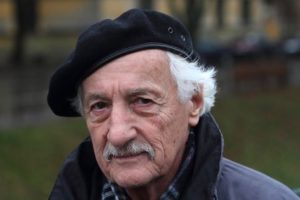
Boris Novak. Photo credit: The Bridge Magazine Veno Taufer. Photo Credit: Alchetron
I attended my first Peace Committee Conference as Chair of PEN’s Writers in Prison Committee in 1994 at the midway point of the Sarajevo siege. At the time PEN was also being asked to help writers who managed to get out of the city. In London I’d met one of these Bosnian writers and gave him my son’s old computer which he accepted as if I’d given him the keys to the city for he had no means to write. Writers fleeing not only the Balkans but situations in Africa and the Middle East needed support as they landed in new locations. It was at the Peace Committee meeting in 1994 that PEN’s Exile and Refugee Network was first conceived in partnership with the Writers in Prison Committee. The initiative was confirmed at the PEN Congress later that fall in Prague.
This initiative for exiles and refugees moved into an exploratory phase which became a leit motif in PEN’s work over the next two decades as it had been in the decades past. PEN’s Exile Network, spearheaded by PEN Centers, including Canada, Sweden, Norway, Germany, Belgium, England, America and many others took the initiative and offered residencies, aid and services to refugee and exiled writers arriving in their countries. Eventually PEN International formed a partnership with the expiring Parliament of Writers Cities of Asylum. In 2006 PEN became a founding member of ICORN—International Cities of Refuge Network. [More in future blog post]
The following year in 1995 the Peace Committee meeting in Bled featured a debate on hate speech, seen as both cause and effect in the conflicts. The gathering included such intellectual luminaries as Adam Michnik, an architect of Poland’s Solidarity movement and editor of the leading newspaper Gazeta Wyborcza in Warsaw. The debate was lively over the incendiary nature of hate speech and the limitations that should be imposed. Both in the Balkans War and in the civil war in Rwanda, which had just ended the year before, hate speech and writing fueled the strife. In spite of PEN’s advocacy for free expression, PEN also called on its members “to use what influence they have in favour of good understanding and mutual respect between nations and people” and pledge “to do their utmost to dispel all hatreds.” Even as “PEN declares for a free press and opposes arbitrary censorship,” it recognizes “freedom implies voluntary restraint” and members pledge “to oppose such evils of a free press as mendacious publication, deliberate falsehood and distortion of facts for political and personal ends.”
The very Charter of PEN contained the axis of the debate. What were or should be limits on expression? Should PEN take a position? At the 1995 Peace Committee conference and in debates since, the views tended to fall according to cultural and national experience. Those in Europe, Africa and elsewhere who had experienced effects of hate speech urged stricter limitations on speech; whereas Americans, bred on the First Amendment of the U.S. Constitution, remained wary of limits and argued that the answer to offensive speech was more speech, the drowning out of harmful ideas with inspiring ones. In my notes of the meeting and debate that year, I find no consensus or clear recommendation except for a reminder from one speaker who knew and quoted Russian exile and dissident Aleksandr Solzhenitsyn: “Don’t go against your conscience and don’t tell lies!”
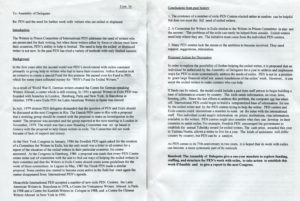
Proposal at 61st Congress for PEN to explore setting up an Exile Network. Resolution passed.
Next Installment: PEN Journey 15: Speaking Out: Life and Death
PEN Journey 12: Tolerance on the Horizon?
PEN International celebrates its Centenary in 2021. I’ve been active in PEN for more than 30 years in various positions and now as an International Vice President Emeritus. With memories stirring and file drawers of documents and correspondence bulging, I am a bit of a walking archive and have been asked by PEN International to write down memories. I hope this personal PEN journey might be of interest.
It was a time of hope, the year when Nelson Mandela and Frederik de Klerk joined in free elections in South Africa, when Yasser Arafat, Yitzhak Rabin and Shimon Peres shook hands and began to live side by side, when the Irish Republican Army and the Ulster Defense Association laid down their arms after twenty-five years of terrorist conflict. The idea of tolerance quivered in the imagination in 1994 even if the realization of tolerant societies still seemed an imaginative leap.
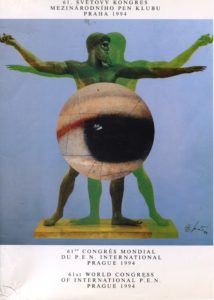
As theme of the 61st PEN Congress, tolerance also challenged the ethnic, national and religious intolerance that gripped dozens of countries in the last decade of the twentieth century. In retrospect the time was perhaps not so different from times since, but we felt we were standing on an historic threshold. The PEN Congress theme of tolerance expressed this hope and optimism.
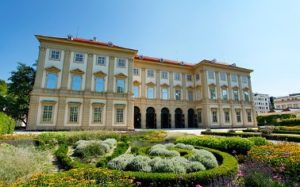
Liechtenstein Palace, garden view
Writers from over 75 PEN centers* around the world came together in Prague that fall for literary and working sessions. The Congress was a grand affair with public gatherings in stately ballrooms, including the Liechtenstein Palace, home of the Prague Academy of Music. Writers who had been imprisoned under the old Soviet regime, including Václav Havel, now ran the country.
Guests of honor included novelist and poet Taslima Nasrin, whom PEN had recently helped extract from the threat of death in Bangladesh (see PEN Journey 11). For protection she was driven around in a state car, and because Sara Whyatt, coordinator of the PEN’s Writers in Prison Committee (WiPC), and I agreed to look after her, we at times found ourselves whisked from meeting to meeting with a police escort, not the usual transport at a PEN Congress.
Though PEN had no mechanisms to change societies, to the extent society changed individual by individual, PEN worked for the writer, turning a spotlight on cases of abuse and challenging the laws which legitimized intolerance.
The voice of the individual writer has always been the most compelling testimony. My report to the Assembly of Delegates that year as Chair of the Writers in Prison Committee focused on those voices:
“Yes, I can hear birds singing. But they are not my friends. They are too far from me. My best friends are spiders and mantis. They are only living things to watch amusedly in my solitary cell. I live and play with them all day long. This excerpt is from a prisoner ten years into a twenty-year sentence written to his PEN minder.
“The image of the spider recurs in the writings of prisoners. One former prisoner I met shortly after taking over as Chair of this committee had come to London to receive treatment for the torture he’d endured. He told of being handcuffed to a generator outside during monsoon season, of not being allowed to wash, using a bucket as a toilet, his arms and hands wrapped around the generator for weeks. Then he talked about being inside in solitary confinement. ‘I had a chance to observe nature: rats, cockroaches, spiders,’ he recalled. ‘Ah, spiders, they are brilliant!’
“Cuban writer Yndamiro Restano, who was arrested in 1991 and sentenced to ten years in prison for preparing and distributing counter-revolutionary propaganda, has written a poem entitled Prison:
Mother,
Do you know where your poet is?
Well, they have dragged me into a dark,
Narrow, lonely cell,
And do you know why,
Mother?
For not allowing fear to carry me away.
But I am not completely alone,
Mother.
I have got to know a good friend here.
A small spider visits me every day
And spins in the door of my cell.
When the guard comes,
I let it know so it hides away.
And doesn’t get killed.
I want it to live,
Mother,
Because I know that it has inside it
Something that I also possess.
However,
It seems that the guard does not know this.
Mother,
Do you know where your poet is?
Well, they have dragged me to a cold,
Narrow, lonely cell.
And do you know why,
Mother?
Because the poet is the only person
Who never forgets
The meaning of freedom.
“The quality the spider has inside so like the writer is the ability to survive, to weave and to work wherever it is. The more difficult the circumstances, the more ingenious the web it weaves. Scientists are in fact currently studying the unique structure of the spider’s silk which gives it the tensile strength of a steel fiber, yet allows it to stretch and rebound from at least ten times its original length, something no metal or synthetic fiber can do.
“The writer’s silk, his tensile yet flexible fiber, is his imagination. It is the imagination and the life of the mind that allows the writers for whom the Writers in Prison Committee works to survive what are sometimes quite desperate physical conditions. One quality that gives the imagination its greatest flexibility and strength is tolerance, the theme of this Congress. It also is that quality and the ability to imagine and empathize with another’s life that prompts those not in prison or under attack to work on behalf of their fellow writers.
“The work of PEN members and Centers in 1994 has been inspiring even if the situation for the writers has been very difficult in many areas of the world. This past year has witnessed some remarkable moves towards tolerance: in South Africa with the first free elections, in Israel and the West Bank with the Israeli-Palestinian peace accord. The WiPC case load has declined with release of political prisoners in these areas, but writers remain in the line of fire and are still targets of those who are trying to disrupt the peace process.
“The past year over 120 writers have been released from prison. Unfortunately many times that number have been arrested, threatened and killed.
“Religion, ethnic and nationalistic tolerance has led to attacks and detention of writers in every area of the world. Religious intolerance of one kind or another continues to undermine intellectual freedom in Iran, Iraq, Pakistan, Bangladesh, Mauritius, Sudan, Egypt, Vietnam and Algeria.
“Often religion is used to justify political interests. No place has the confrontation between “religious” and state power been more devastating than in Algeria, where over 25 writers and journalists have been killed and dozens detained in the past two years.
“Ethnic, national and religious intolerance often merge as in the former Yugoslavia and other areas of the Balkans.
“The most brutal outbreak of ethnic intolerance globally this year has been in Rwanda, where over 37 writers and journalists have been killed, most targeted for their ethnic, and thus political background.
“Ethnic conflict, which is also political conflict, currently stirs in Nigeria where Ken Saro Wiwa, advocate for the Ogoni people, is in jail and reportedly tortured and in Kenya where Koigi wa Wamwere exposed “ethnic cleansing” in the Rift Valley and has been detained on charges which carry the death penalty.
“The most difficult country with the largest number of Writers in Prison Committee cases continues to be Turkey where those discussing and debating the Kurdish situation in the Southeast are charged with “disseminating separatist propaganda” under Article 8 of the Anti-Terror Law and are imprisoned. Killings and torture are reported by both sides of this conflict. PEN records over 250 cases in Turkey.
“The other country which continues to lead our list with the most main cases is China where over 45 writers, a third of these in Tibet, are imprisoned. Though China has released some prominent dissidents this year, the Chinese authorities have also arrested at least twice as many writers as they have released…”
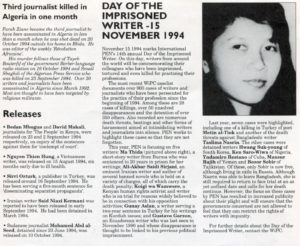
From PEN’s Centre to Centre newsletter October/November, 1994.
The Chair’s report for 1994 notes progress but also shows how little has changed for writers in the past 25 years in many areas of the world such as Turkey and China though there has been progress in Algeria, Rwanda, the Balkans, Nigeria and Kenya. The Day of the Imprisoned Writer campaign in November, 1994, noted in the newsletter above, focused on five writers. Of these Ma Thida was released and eventually started a Myanmar/Burma PEN Center and now serves on the PEN International Board; Koigi wa Wamwere was released and is a celebrated Kenyan writer. Gunay Aslan and Gustavo Garzon, also released, continue to create. Ali-Akbar Sa’idi Sirjani died in Iranian prison under mysterious circumstances in November 25, 1994.
With attention and advocacy, circumstances improve for individual writers, but many writers who are released have to go into exile. At the Prague Congress PEN began to expand its thinking and resources to develop services for exiled writers. (Future blog post.)
A highlight of the 61st Congress was the address by Czech President Václav Havel, fellow writer and playwright whose first play “Garden Party” lampooned the communist system in 1963. In 1969 he was barred from his job as a writer/editor after the suppression of the Prague Spring reforms in 1968, and he was forced to work as a manual laborer. In 1977 he became the spokesman for the Charter 77 dissident group that criticized the communist officials and was given a suspended sentence of 14 months. After publishing in 1978 “Power of the Powerless” which was an analysis of how a totalitarian regime kept power by corrupting and manipulating citizens, he was sentenced to four and a half years in prison for “subversion” against the state. During this time PEN worked actively on his case, pressuring diplomats around the world. Havel was released after three and a half years but then imprisoned again after meeting dissidents and the French President in Prague in 1989. Havel was sentenced to nine months, but widespread protests from home and abroad, many generated by PEN, brought his release in May. In November, 1989 the communist regime fell. In December 1989 Václav Havel was elected President of Czechoslovakia, which eventually split. At the time of the PEN Congress he was in his first year as President of the newly independent Czech Republic.
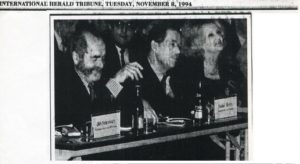
Left to right: Jiří Stránský, President Czech PEN, and Czech President Václav Havel
Abridged speech of Václav Havel to the Opening of the 61st PEN Congress in Prague November 7, 1994:
“Several times in my life I have had the honour of being invited to a world congress of the International PEN Club. But the regime always made it impossible for me to attend. I had to live to the age of fifty-eight, go through a revolution in my country, become the nation’s president, and see the World Congress held in Prague, to be able to participate in this important event for the first time in my life. I am sure you will understand therefore, that this is a very moving moment for me.
“Yes, we live in a remarkable time. It is not just that we now learn, almost instantaneously, about all the deeply shocking atrocities that take place in the world; it is also a time when every local conflict has the potential to divide the international community and become the catalyst for a far wider conflict, one that in many cases is even global. Who among us, for instance, can tell where the present war in Bosnia and Herzegovina may lead, to what tragic confrontation of three spheres of civilization, if the democratic world remains as indifferent to that conflict as it has so far?
“I think that in these matters, writers and intellectuals can and must play a role that only they can fill. They are people whose profession, indeed, whose very vocation is to perceive far more profoundly than others the general context of things, to feel a general sense of responsibility for the world, and to articulate publicly this inner experience.
“To achieve this, they have essentially two instruments available to them.
“The first is the very substance of their work—that is, literature, or simply writing. Deep analysis of the tangled roots of intolerance in our individual and collective unconsciousness and consciousness, a merciless examination of all the frustrations of loneliness, personal inadequacies and the loss of metaphysical certainties that is one of the sources of human aggression—quite simply, a sharp light thrown on the misery of the contemporary human soul—this is, I think, the most important thing writers can do. In any case, there is nothing new in this: they have always done that, and there is no reason why they should not go on doing so…
“But there is another instrument, an instrument that intellectuals sometimes avail themselves of here and there, though not nearly often enough in my opinion. This other instrument is the public activity of intellectuals as citizens, when they engage in politics in the broadest sense of the word. Let us admit that most of us writers feel an essential aversion to politics. We see entering politics as a betrayal of our independence, and we reject it on the grounds that the job of the writer is simply to write. By taking such a position, however, we accept the perverted principle of specialization, according to which some are paid to write about the horrors of the world and human responsibility, and others to deal with those horrors and bear the human responsibility for them. It is the principle of a rather doubtful division of labour: some are here to understand the world and morality, without having to intervene in that world and turn morality into action; others are here to intervene in the world and behave morally without being bound in any way to understand any of it…
“In short, I am convinced that the world of today with so many threats to its civilization and so little capacity to deal with them, is crying out for people who have understood something of that world and know what to do about it to play far more vigorous role in politics. I felt this when I was an independent writer, and my time in politics has only confirmed the rightness of that feeling, because it has showed me how little there is in world politics of the mind-set that makes it possible to look further than the borders of one’s own electoral district and its monetary moods, or beyond the next election.
“I am not suggesting, dear colleagues, that you all become presidents in your own countries, or that each of you go out and start a political party. It would, however, be wonderful if you were to do something else, something less conspicuous, but perhaps more important: that is, if you would gradually begin to create something like a world-wide lobby, a special brotherhood or, if I may use the word, a somewhat conspiratorial mafia whose aim is not just to write marvelous books or occasional manifests, but to have an impact on politics and its human perceptions in a spirit of solidarity, and in a coordinated, deliberate way…”
“Let me conclude with one final plea: do not fail to raise your common voice in defence of our colleague and friend Salman Rushdie, who is still the target of a lethal arrow, and in defence of Nobel Laureate Wole Soyinka, who is unable to join us here because his government prevented him from coming. I also beg you to express our common solidarity with all Bosnian intellectuals who have been waging a courageous and unequal struggle on the cultural front with the criminal fanaticism of the ethnic cleansers, those living examples of the lengths to which human intolerance can eventually go.”
Next Installment: PEN Journey 13: PEN and the U.N in a Changing World
*Delegates representing 73 PEN Centers attended the 61st Congress, along with observers from three proposed new centers—Malawi, Guadalajara and Iranian Exiles Abroad. All three were elected as new PEN centers at the Congress, along with new centers in Ghana and Kyrgyzstan and a revived Egyptian PEN center.
PEN Journey 11: Death and Its Threat: the Ultimate Censor
PEN International celebrates its Centenary in 2021. I’ve been active in PEN for more than 30 years in various positions and now as an International Vice President Emeritus. With memories stirring and file drawers of documents and correspondence bulging, I am a bit of a walking archive and have been asked by PEN International to write down memories. I hope this personal PEN journey might be of interest.
In Bangladesh novelist Taslima Nasrin was in hiding. Death threats had been issued, a price put on her life. On the streets of Dhaka and other cities, crowds threatened to hang her because of her words in a newspaper challenging the Koran and Islamic laws and because of her novel Lajja (Shame) which depicted Muslim atrocities on Hindus after a mosque’s destruction in Ayodhya, India.
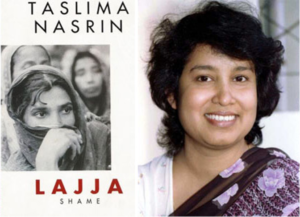
The time was summer, 1994. In London Sara Whyatt, PEN’s Writers in Prison Committee Coordinator, and I sat in a Kensington hotel restaurant waiting to meet a man who’d called the office and said he was Taslima’s brother and wanted to talk with us. PEN had been actively working on Taslima’s case for the past year, sending out Rapid Action Alerts, meeting with Bangladeshi government officials in London and in the U.S. and Europe, calling on the government to protect her. The case had gained international attention. Given recent violence around fatwas, including those on Salman Rushdie, we were wary. We didn’t know Taslima had a brother. We spoke with MI5 who advised us to have a spotter for the meeting. We arranged a tell so that if the encounter was not legitimate or we perceived trouble, I would take my sunglasses from the top of my head and set them on the table. The spotter—PEN’s bookkeeper—sat at another table and could quickly summon help. We weren’t certain, but we thought MI5 was also in the hotel.
In retrospect the drama around Taslima’s case seems inflated, but during that period of 1993-1994 the situation had escalated to the point that religious leaders were warning that the government would be overthrown if Nasrin was not arrested. In June, 1994 when an arrest warrant was issued, Taslima went into hiding. A nationwide hunt was launched, and snake charmers carrying poisonous snakes marched in Dhaka and warned that thousands of snakes would be let loose if Nasrin was not arrested by June 30.
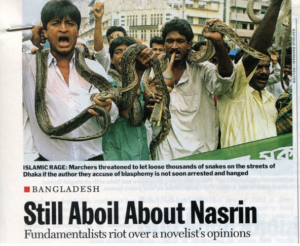
Time, July 11, 1994. Photo by Rafique Rahman-Reuters
In this atmosphere PEN had received the call from Taslima’s older brother. International PEN’s Writers in Prison Committee and PEN’s Women’s Committee, in particular its chair Meredith Tax in New York, had been in touch with Taslima and her lawyers, but in the time of faxes, (now fading), inconsistent telephone connections, and no internet between writers, no one had yet confirmed a brother coming through London. This kind of high drama was not PEN’s usual modus operandi. In the years I chaired PEN’s Writers in Prison Committee (1993-1997), more than 900 writers threatened, detained, in prison, and killed came across PEN’s desk annually. Approximately a quarter of these were designated main cases which meant PEN had sufficient information to verify the situations and had members to work on the writer’s behalf. However, only a few became global causes like Taslima’s, gathering energy, attention and advocates around the world. This usually happened when the threat of death was credible and immanent and when the circumstances of the writer connected to larger issues.
That day in London, a man in his thirties approached our table. He looked so much like pictures of Taslima that we quickly set aside our suspicions. He worked for an airline and was passing through London. He was able to answer questions and confirm details of the case such as what Taslima had actually said to the newspaper which had misquoted her calling for revision of the Koran. I still have my notes from that meeting. Her brother explained that Taslima had said she wanted to modify Sharia laws, not the Koran. “I want men and women to be equal,” she’d said. She was charged with blasphemy under a law left on the books by the British.
Her brother told us that her lawyer was afraid. The lawyer couldn’t move for bail unless Taslima was present, but if the government didn’t give security for her, they couldn’t take the risk of Taslima coming to court. The government said if Nasrin went to court, anything could happen in court or in jail. In jail she could be killed. Her father’s home had been attacked, and he was now under protection.
Her brother confirmed that Taslima had finally agreed that she needed to leave Bangladesh though she was reluctant. “If I go from Bangladesh, who can write about these poor women?” she asked. And yet she wasn’t able to write anything now, he said, and her life was not safe if she stayed.
Her trial date had been set for Aug. 4. If she didn’t appear, the government would seize her things, including her passport, which they had taken away before but had returned when she resigned her post as a doctor. She was a medical doctor as well as writer.
Her brother’s message to us that day was: “Save my sister!”
Through discussions with her lawyer, with selected PEN members and with the Bangladeshi courts, it was finally arranged that Taslima would turn herself in late in the evening. Bail would be set and met, and in disguise she would leave the court. The president of Swedish PEN flew to Dhaka and accompanied her in a flight to Sweden, where she lived for years in exile.
It was lonely in exile. I met with Taslima in early September 1994, a few weeks after her arrival in Stockholm. I have notes from those meetings. “One day I’ll go back,” she said, “but I don’t know if I could live in my country anymore. I don’t know what will happen. I want to live in Bengal, but they will kill me. I couldn’t take my writing out.”
She explained that she was from a Muslim family with Hindus as her neighbors. “From the beginning I went to their houses, played with them. I know their culture, attitudes. I know their happiness and sorrow from childhood. It is not difficult for me to reach them.” After the violent incidents in Ayodhya, India where Hindu women were raped and their homes looted, she said, “I felt them. I have felt the danger and had to write for them…Why can’t I write a book in reverse, but they feel they should write my book in the case like Lajja…In India, Hindus can’t feel Muslim, and Muslims can’t feel Hindu…In Bengal, Hindu and Muslim live separately…People think men are superior to women. Women always get advice from men. Mothers are always kept quiet. It is not allowed for a mother to give advice to a son.”
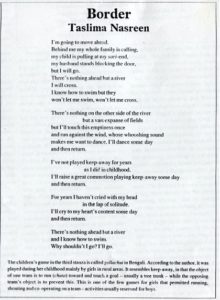
London Review of Books, September 8, 1994
At the time and in retrospect at PEN we questioned whether any of our actions escalated the situation for Taslima’s case. This was the Bangladeshi government’s argument, but Amnesty and numerous human rights and freedom of expression organizations also highlighted her situation. Through IFEX, the International Freedom of Expression Exchange of which PEN was a founding member, reports circulated worldwide. The fact was, Taslima Nasrin was in real danger. PEN went into action and helped with her extraction.
In November 1994 Taslima was a special guest at the 61st PEN International Congress in Prague, opened by Vaclav Havel as the keynote speaker. In December that year she received the prestigious Sakharov Prize for Freedom of Thought, given by the European Parliament.
Though Taslima’s case was the most celebrated at the time, there were numbers of other writers and women under threat because of their writing. In a town in Northern Greece Anastasia Karakasidou had received anonymous letters threatening to rape and kill her in front of her children because of her scholarly dissertation on the ethnic Slav population in that region. In Algeria another woman writer stayed in her house afraid even to go out on the street because her words challenged both government and fundamentalists’ violent policies. She had not received a direct death threat, but she was a well-known and recognized writer in a country where more writers had been killed in that past year than in almost any other, including Somalia, Angola and the former Yugoslavia.
Death was the ultimate censor, and the threat of death was its chilling companion. International PEN’s Writers in Prison casebook at the time listed at least 22 countries where writers were under death threats. In four countries the writers had gone into hiding. Death threats also prompted self-censorship for many writers. Most of the threats did not come directly from governments but from individuals who professed to be offended by the writer’s words. The offense, however, was almost always tied to a political or religious position, and the writer’s life became a political, not a moral, consideration.
While issues of communal violence and religious and political Islam differed from the rights of ethnic minorities in Northern Greece or from political probity in Argentina, Guatemala, Peru, Paraguay where PEN listed high numbers of death threats, the common need in all these cases was for the government to protect the writers and take action against those who issued the threats.
Next Installment: PEN Journey 12: Tolerance on the Horizon?
PEN Journey 10: WiPC: Beware of Principles
PEN International celebrates its Centenary in 2021. I’ve been active in PEN for more than 30 years in various positions and now as an International Vice President Emeritus. With memories stirring and file drawers of documents and correspondence bulging, I am a bit of a walking archive and have been asked by PEN International to write down memories. I hope this personal PEN journey might be of interest.
In the summer of 1993 before taking over the Chair of PEN International’s Writers in Prison Committee I studied hundreds of individual cases on PEN’s list of over 900 cases which was published twice a year. I studied the regions of the world where conflict was rife, where governments were most oppressive and where writers were most threatened. I also used the time to conceive three long term projects because I knew when the job began, there would be less time for long term thinking.
First, I hoped we could gather the many poems and stories from imprisoned writers over the years and get these published into a book. In studying the cases, I came to understand that those who survived harrowing experiences were often those able to keep their imaginations alive and if possible were able to write. “We lived in Paris in our minds,” one prisoner in dire conditions inside the Western Sahara recounted. A book of these writings would celebrate and inspire and could also be used by PEN centers in their work.
Second, I wanted to convene the Writers in Prison Committees from around the world in a conference to strategize our work. PEN’s other standing committees had such meetings outside of the congresses, but WiPC never had. The PEN congresses were often filled with competing programs and those working on WiPC issues were not always the delegates. We needed to gather and plan together for several days.
Finally, I hoped to expand the roster of Writers in Prison Committees in the PEN Centers so that we could increase the number of members working and the number of writers on whose behalf we worked.
WiPC Coordinator Sara Whyatt and researcher Mandy Garner and I agreed on each of these goals. Every two weeks we met in the large airy WiPC office at the top of the Charterhouse Buildings in London or often at the tea shop across the alley. At the end of our strategy sessions we would discuss how to move forward the longer range goals. I learned an important lesson—first, a goal begins with an idea then is realized by having talented, committed people around. For me that began with Sara and Mandy, who set steps in motion. And then each project found a path forward as people arrived into our circle to help accomplish the tasks.
One day a publisher showed up in our office and asked if we had ever considered doing a book of prisoners’ writings. As a matter of fact…We quickly outlined our idea, put together a team with former WiPC coordinator Siobhan Dowd as editor, and a year and a half later in 1996 This Prison Where I Live was on book stands with selections from more than 65 writers who had been imprisoned, many of whose cases PEN had worked on, from Arthur Koestler to Cesar Vallejo, Alexander Solzhenitsyn, Jacobo Timerman, Breyten Breytenbach, Pramoedya Ananta Toer, Primo Levi, Wole Soyinka, Vaclav Havel, Ngugi wa Thiong’o, Nazim Hikmet, Ken Saro-Wiwa, and many others, current and former writers in prison.
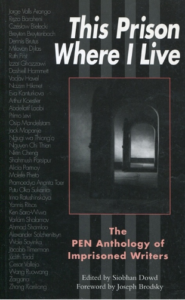
From This Prison Where I Live:
You took away all the oceans and all the room.
You gave me my shoe-size with bars around it.
Where did it get you? Nowhere.
You left me my lips, and they shape words, even in silence.
—Osip Mandelstam, former USSR, 1935
When we shared our second hope for a global gathering, Danish PEN offered to host the conference in Helsingor, the home of Hamlet. With representatives of PEN centers on every continent, this first WiPC conference convened in the spring of 1996. The WiPC gathering has been held biennially ever since at locations around the world. (More on this conference in a later post.)
Regarding the third goal, the number of PEN centers with Writers in Prison Committees has grown each year because of PEN members around the globe. Unfortunately, the number of cases of writers threatened, imprisoned or killed has also continued to grow, but individual cases are released.
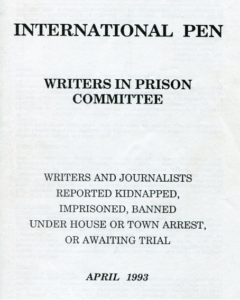
In that summer preparing to take over the Chair, my predecessor and mentor Thomas von Vegesack gave me advice I found puzzling at first. He invoked: “Beware of principles!” Thomas was an empathetic and principled man so I was perplexed by his counsel, but over the years I’ve come to understand what he meant. He meant that declarations and statements can often keep you from seeing a way forward and from understanding how to work on a case if you get tangled in abstractions.
There are of course principles that govern our work enshrined in the Universal Declaration of Human Rights. These are fundamental, but Thomas was warning that it is important to understand each situation and not let rigidity, a kind of authoritarianism of principles or political correctness limit.
PEN’s Charter itself contains contradictory concepts. The Charter asserts that PEN members should “use what influence they have in favour of good understanding and mutual respect between nations and people; they pledge themselves to do their utmost to dispel all hatreds and to champion the ideal of one humanity living in peace and equality in one world.”
At the same time the Charter notes that “PEN stands for the principle of unhampered transmission of thought within each nation and between all nations, and members pledge themselves to oppose any form of suppression of freedom of expression in the country and community to which they belong…”
These two ideas of respect and freedom of expression have been challenged more than once, a decade ago in the case of the Danish cartoons. (More on this in a future post.)
Ultimately each PEN member has to resolve the inherent tension. Those from societies with longer democratic traditions are more accustomed to balancing competing ideas; but there are no certain answers. PEN has had lengthy discussions and debates on such questions as “hate speech”—what constitutes it, are there limits to freedom of expression—on slander and libel, holocaust denial, blasphemy.
These challenges for PEN are manifested in individual cases. Early in my tenure as Writers in Prison Chair, one such case blew up quickly, gathering headlines across the globe—the case of Bangladeshi writer Taslima Nasrin. Dr. Nasrin (she was a medical doctor turned writer) had written a novel Lajja (Shame) which described the Muslim backlash against Bangladesh’s Hindu minority after the destruction of a mosque. She was also quoted (misquoted, she said) suggesting that the Koran should be revised in favor of women. An arrest warrant was issued for her; demonstrators called for her death, and at one point snake charmers in Dhaka threatened to release their cobras into the streets if she wasn’t executed. PEN’s Writers in Prison Committee and PEN’s Women’s Committee took up the case, which had bizarre twists along the way.
Next Installment: PEN Journey 11: Death and Its Threat: The Ultimate Censor
PEN Journey 9: The Fraught Roads of Literature
PEN International celebrates its Centenary in 2021. I’ve been active in PEN for more than 30 years in various positions and now as an International Vice President Emeritus. With memories stirring and file drawers of documents and correspondence bulging, I am a bit of a walking archive and have been asked by PEN International to write down memories. I hope this personal PEN journey might be of interest.
Twelve-foot puppets danced outside the dining room’s second floor windows at our hotel, billed as the “oldest hotel in the world,” set on the central plaza of Santiago de Compostela, Spain, the venue for PEN International’s 60th Congress.
Sara Whyatt, coordinator of PEN’s Writers in Prison Committee, and I hurried to finish breakfast and our agenda before we joined the crowds outside at the historic Festival of St. James. That evening International PEN’s 60th Congress would convene. Hosted by Galician PEN, the Congress had as its theme Roads of Literature, which seemed appropriate as pilgrims from around the world also gathered on the Obradoiro Plaza in front of the ancient Cathedral, the destination for their Camino.

Parador Hotel, Santiago de Compostela St. James Festival, Obradoiro Plaza, Santiago de Compostela
At this Congress the presidency of PEN was changing hands as was the chairmanship of the Writers in Prison Committee, which I was taking over from Thomas von Vegesack. Ronald Harwood, the British playwright, was assuming the PEN presidency from Hungarian novelist and essayist György Konrád, who had been a philosophical president, often running the Assembly meetings like a stream of consciousness event where the agenda was a guide but not necessarily a governing map. Ronnie ran the final meeting like a director and dramatist, determined to get the gathering from here to there with a path and deadline. Both smart, experienced writers, committed to PEN’s principles, they had very different styles. Known only to a few of the delegates a surprise visitor was also arriving mid-Congress.
The 60th Congress in September 1993 was a watershed of sorts. It was the first since the controversial Dubrovnik gathering six months before which had split PEN’s membership (see PEN Journey 8) because of the war in the Balkans.
Konrád’s opening speech to the Assembly explained that PEN’s leadership had gone ahead with the congress over the many objections from PEN centers because the venue had been approved earlier by the Assembly and the host center had been unwilling to postpone. He acknowledged the widespread criticism and also the concern that some individuals who fomented the Balkan wars and participated in alleged war crimes were writers who had been members of PEN. He said, “That these men of war also include men of letters, indeed that these latter are well represented, painfully confronts our professional community with the notion of our responsibility for the power of the Word. Nationalist rhetoric led to mass graves here, and there. Mutual killings would not have been on such a scale in the absence of words that called on others to fight or that justified the war.”
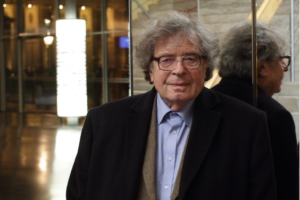
György Konrád, PEN International President 1990-1993, Credit: Gezett/ullstein bild, via Getty Images
Konrád’s address at the opening session went a way in bringing the delegates together. “What we can do is to try and ensure the survival of the spirit of dialogue between the writers of the communities that now confront each other….International PEN stands for universalism and individualism, an insistence on a conversation between literatures that rises above differences of race, nation, creed or class, for that lack of prejudice which allows writers to read writers without identifying them with a community…
“Ours is an optimistic hypothesis: we believe that we can understand each other and that we can come to an understanding in many respects. The existence of communication between nations, and the operation of International PEN confirm this hypothesis…PEN defends the freedom of writers all over the world, that is its essence.”
Ronald Harwood added in his acceptance for the presidency: “The world seems to be fragmenting; PEN must never fragment. We have to do what we can do for our fellow-writers and for literature as a united body; otherwise we perish. And our differences are our strength: our different languages, cultures and literatures are our strength. Nothing gives me more pride than to be part of this organization when I come to a Congress and see the diversity of human beings here and know that we all have at least one thing in common. We write…We are not the United Nations…We cannot solve the world’s problems…Each time we go beyond our remit, which is literature and language and the freedom of expression of writers, we diminish our integrity and damage our credibility…We don’t’ represent governments; we represent ourselves and our Centres…We are here to serve writers and writing and literature, and that is enough…And let us remember and take pleasure in this: that when the words International PEN are uttered they become synonymous with the freedom from fear.”
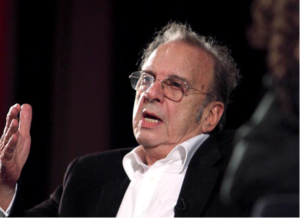
Ronald Harwood, PEN International President 1993-1997. Credit BAFTA
PEN’s work to defend writers and protect space free from fear fell in large part to the Writers in Prison Committee, the largest of PEN’s standing committees with over half the PEN centers operating their own WiP Committees. Members elected the writers who were in prison for their writing as honorary members of their centers, corresponded with them and their families, advocated on their behalf with their own governments and with the governments where the writers lived. PEN’s London office provided the research, selected the cases, planned campaigns and worked with international bodies. The means and methods have modified over the years as the internet and social media have developed, but the focus has remained on the individual writer whose case is pursued until it is resolved. With consultative status at the United Nations, International PEN and its Writers in Prison Committee work through the Human Rights Commission and UNESCO and with other international institutions lobbying on behalf of writers.
At the time of the 60th Congress focus of WiPC’s work included China, Turkey, Algeria, Burma, Syria and Nigeria. In Turkey that summer an arson attack at an arts festival in Sivas had killed at least 37 people, seven writers and poets. One of the writers at the festival Aziz Nesin was translating Salman Rushdie’s Satanic Verses into Turkish and had started to serialize the book in a newspaper. Nesin’s presence at the festival was said to inflame the local crowds. Though Nesin survived, it was reported he was beaten by the firefighters who saved him, and a subsequent investigation held the Turkish state responsible. China continued to have more WiPC cases than any country except Turkey. The threat of death for writers had intensified in Algeria where Islamic extremists had assassinated six writers, including the novelist and journalist Tahar Djaout. In Nigeria the brief imprisonment and possible sedition charges against writer Ken Saro Wiwa, President of the Nigerian Association of Authors, founding member of Nigerian PEN and leader of the Movement for the Survival of Ogoni People was highlighted after his passport was confiscated. A few years later his situation would inspire a global mobilization by PEN and human rights groups after Saro Wiwa was condemned to death by Nigeria’s de facto President Sani Abacha.
The focus of the 60th Congress remained on the Balkans and on growing religious extremism. PEN’s surprise guest appeared at the Assembly in the middle of the Peace Committee report on the Balkans. That morning delegates had entered through a metal detector and security check, the first and only time in my years at PEN. The day before, the guest was to have slipped into the hotel secretly because of security concerns, but the plaza outside was filled with people who had come to see the arrival not of Salman Rushdie but of singer Julio Iglesias who arrived at the same time. Rushdie was quickly whisked inside. That evening a small group gathered for dinner with Rushdie in a private dining room at the hotel. I remember sitting beside Salman and sharing a dessert with him but have no notes from the dinner and remember only a discussion of PEN’s further campaign on his behalf. At the time the fatwa weighed heavily. Translators and publishers of Rushdie had been killed and attacked.
The next morning Rushdie arrived in the hall during the Peace Committee’s report which took a break for Rushdie’s address. The Assembly passed a resolution again condemning the fatwa and urging Iran to rescind it and urging all PEN Centers to continue lobbying their governments on Rushdie’s behalf and to put the case on the agenda of the International Court of Justice and other multilateral fora.
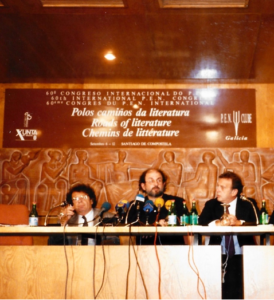
International PEN 60th Congress Assembly of Delegates in Santiago de Compostella 1993. Left to right: György Konrád, Salman Rushdie, Ronald Harwood
To the Assembly Rushdie noted: “…in the Muslim world, in the Arab world when journalists and academics and other visitors ask writers, intellectuals, and other dissident figures in those countries what they think, they repeatedly say: ‘The reason you must defend Rushdie is that by doing so you defend us also.’ For example, Iranian dissident intellectuals, 167 of whom recently signed a very passionate declaration in support of me and of the principles involved in this case, say that the real target of the Khomeini Fatwa and of Iranian state terrorism is not Rushdie, it is them.’ After all I have protection; they don’t. And what the terror campaign means is ‘If we can do this to Rushdie, think how much we can do to you.’”
He said, “There is something I wanted to say about the issue of fear. I do think that a lot of people who mean well and wish to combat this kind of attack are silenced by fear, and think that by remaining silent, somehow things will get better…But the one thing that I’ve learned is that silence is always the biggest mistake, always no matter how great the temptation to silence might be, for a very simple reason. If you are silent, you allow your enemy to speak, and therefore you allow him to set the terms of the debate…I think one of the reasons I’m here is that all of you, and thousands of people around the world have not remained silent.”
Rushdie thanked PEN for its work on his behalf. When asked how this situation affected his writing, he said he’d actually become more optimistic. “I was determined to construct a happy ending and discovered it is very difficult. Happy endings in literature as in life are very difficult to arrange…[but] the answer is that it’s made my writing much more cheerful.”
Rushdie stayed after his address and participated in the discussion on the Balkans. Miloš Mikeln, chair of the Peace Committee, reported that besides help provided to writer refugees and those staying in Sarajevo, the Peace Committee was closely following and analyzing the situation in the war regions, focusing on writers’ involvement in instigating chauvinistic hatred and war propaganda. The most drastic case was that of the Serbian poet from Bosnia, Mr. Radovan Karadzic, who was now the President of the self-proclaimed Serbian Republic of Bosnia. The Peace Committee report noted that he’d used his literary talent and his reputation as a writer to foster ethnic and religious hatred and to promote genocide in Bosnia-Herzegovina. “As writers who deeply believe in freedom of expression we cannot remain silent in the face of such an abuse of the freedom,” Mikeln said. “We find it incumbent upon us to condemn Radovan Karadzic for his violation of all the values that we and International PEN stand for.”
After lengthy debate on whether to name names in resolutions, this condemnation was accepted and taken as a statement of the Writers for Peace Committee. Personal condemnation is highly unusual for PEN, used most notably in the expulsion of Nazi writers in 1933. The debate further focused on the responsibility of PEN members, in particular Serbian PEN members and the Serbian center. It is also very unusual for the PEN Assembly to publicly call out a center. The resolution noted, “Writers in Serbia actively supported chauvinistic propaganda, misusing their influence as writers and thus instigating hatred, destruction and war. These actions including public statements by ___ and _____clearly run against the principles of International PEN. The 60th World Congress…condemns such a blatant abuse of our profession. We expect the Serbian PEN to take a stand against this breach of writers’ ethics as we would expect of any Center confronted by a similar situation.” In this instance the names were included in the original resolution but after debate were left out of the resolution passed by the Assembly.
The Bosnian delegate made a passionate plea protesting what was happening in Bosnia and the characterization of the situation as “civil war” by others. Rushdie said that the delegate from Bosnia was justified and should be heard. Whatever the rights and wrongs of the situation, there was no question that the crimes committed against Bosnia had been the greatest and Sarajevo the most tragic case, Rushdie said, and he hoped the delegate was wrong when he said people outside did not care and did not want to know. The destruction of Sarajevo would haunt Europe for generations, and he added that the people who had wanted to maintain a unified society had been sacrificed, and it was hard not to believe that it was because they were Muslims. Suppose the Serbs had been Muslims. The Bosnian culture was the culture of Europe.
The Assembly of Delegates approved the Peace Committee’s resolution with names removed and also endorsed a recommendation by Russian PEN that was to be annexed to the resolution. That statement declared that PEN “expresses its firm conviction that the duty of writers, and particularly of the writers of those ethnic groups and countries which are directly involved in the armed conflicts is not to espouse national interests but, in the cause of the unity of the world, promote negotiation and compromise so as to obtain the solution of all conflicts.”
PEN Congresses are full of speeches and resolutions, words offered in a world buffeted by much harder power, but PEN members have faith that words matter and can have power for good or ill, that there is a difference between words that aim for truth and words that are used for propaganda. At that time and in times before and since, words have inspired peace but also inflamed towards war. PEN remains a place where words and actions come together in campaigns to preserve the freedom of writers to use their words.
At the 60th PEN Congress in the grand ballroom of the oldest hotel in the world a new Bosnian Center whose members were Serb, Croat and Bosnian was unanimously welcomed as was an ex-Yugoslav Center for writers who no longer lived in the region.
Next Installment: PEN Journey 10: WiPC: Beware of Principles
PEN Journey 8: Thresholds of Change…Passing the Torch
PEN International celebrates its Centenary in 2021. I’ve been active in PEN for more than 30 years in various positions and now as an International Vice President Emeritus. With memories stirring and file drawers of documents and correspondence bulging, I am a bit of a walking archive and have been asked by PEN International to write down memories. I hope this personal PEN journey might be of interest.
In fall, 1991 I went to Moscow just months after the August coup attempt in which hardline Communists sought to take control from President Mikhail Gorbachev. I hopped onto the visa of my husband who was traveling to Russia as a Visiting Scholar at the International Institute of Strategic Studies in London. I went as a writer, interested in meeting other writers. I contacted fellow PEN member and Russian translator Michael Scammell, who had previously chaired International PEN’s Writers in Prison Committee (WiPC). Michael gave me a list of writers to contact in Moscow.
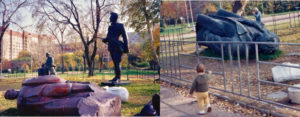
Statues toppled of Lenin and Stalin and others in park after failed coup attempt in Moscow, 1991.
My husband and I stayed in what I was told was one of the government hotels where guests were hosted but also watched. We were watched too, I’m fairly certain, though there was little for anyone to see with me. I was cautious as I made contact with the writers lest my reaching out compromise them. Only a few years before, PEN’s case list had included many dissident Soviet writers in prison. Michael and later WiPC Chair Thomas von Vegesack and PEN’s WiPC committees around the world had advocated for the release of dissident Soviet writers, many of whom were imprisoned in the gulags. PEN had also covertly sent aid to them and their families through the channels of the PEN Emergency Fund.
I no longer remember if I called or faxed the writers in advance. (Fall, 1991 was before an active internet.) I likely made contact when I arrived. The writers welcomed me. We met in simple apartments with old holiday cards on the mantles as decorations, a paper mobile hanging from the light fixture over one dining room table I recall, strips of newspaper stacked by the toilets in lieu of tissue. The economy was spare for these writers. They hoped for change and for freedoms to come, but they were cautious. In these meetings and in other random encounters, people were curious about the United States. On the street, vendors not only sold Russian nesting dolls with the rushed visages of Boris Yeltsin, who had defied the tanks of the coup, and of Gorbachev but also stacking dolls of U.S. presidents, including one set that had George Washington and Abraham Lincoln. I was asked by numbers of people, including the writers, if I could get them copies of the U.S. Constitution and the Federalist papers. The Berlin Wall had fallen and times were changing, but no one knew how that change would settle out in the Soviet Union.
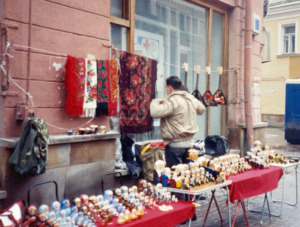
Stall of street vendor selling Russian Matryoshika dolls, including stacking dolls of Boris Yeltsin and Mikhail Gorbachev and also U.S. Presidents.
I remember one meeting in Moscow with members of a women’s theater cooperative—actresses, director, costume designer, and playwright. Before the member who spoke English arrived, we were left to communicate with each other by hand gestures and a few common words. Finally, the sturdy, broad-chested Russian writer who spoke English entered. I asked her what she did during the coup attempt. She stood, spread out her arms and declared triumphantly, “I stopped the tanks with my breasts!” This image has stayed with me, along with her words and the determined words of her fellow thespians and writers in that apartment, women demanding as their due freedoms they hadn’t yet experienced.
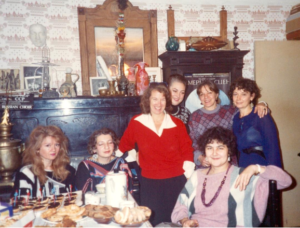
Joanne and members of Russian women’s theater cooperative in Moscow apartment, 1991.
Not only in the USSR but elsewhere, old dictatorships were crumbling, in Africa and Latin America. PEN was a refuge writers often looked to before democracy and political liberalization took hold in their countries. In September 1991 at the Vienna Congress, a month after the coup attempt, the Soviet Russian Center applied and received approval to change its name to Russian PEN. The debate within PEN was when to recognize a center. It was necessary to have enough qualified writers committed to the freedoms embedded in the PEN Charter and to have an environment in which the writers could feasibly operate, at least to some extent.
As the USSR broke apart, writers gathered and petitioned for PEN centers, sometimes before the regions claimed full independence. A PEN Center of the Soviet Asian Republics, including the literatures of the five separate regions of Kazakhstan, Uzbekistan, Turkmenistan, Kyrgyzstan and Tadzhikistan had been recognized at the Paris gathering in April 1991, but by PEN’s September 1993 Congress in Santiago de Compostela, Spain, writers from Kazakhstan, Kyrgyzstan and Turkmenistan all proposed separate centers of PEN. Russian PEN supported the disbanding of the Soviet Central Asian Center because it had not functioned, because the Soviet Union no longer existed, and because the President of the center had made public statements racially slandering others, and he refused to withdraw these. It is rare for PEN to challenge a member and withdraw membership, but the use of PEN to advocate racially intolerant and provocative positions is a rationale; PEN did so as well with certain members in the Balkans during the war there.
The Kazakhstan Center was accepted as a PEN Center at the Congress in 1993; the vote on Kyrgyzstan’s proposal was delayed until more information about the writers could be gathered, and it was agreed the situation in Turkmenistan, still governed by a dictatorship, remained too problematic for a PEN center to exist.
PEN often mirrored the global landscape. In the early 1990’s PEN added centers in Albania, Azerbaijan, Georgia, Kazakhstan, Moldova, Mongolia, Montenegro, Bosnia, and an ex-Yugoslav Center for writers in exile from the former Yugoslavia. Also new centers formed in the Congo, Mozambique, Malawi, Kenya, Guadalajara, Palestine as well as a Chinese Writers Abroad Center, an Iranian Writers in Exile Center, and an African Writers Abroad Center. The abroad and exile centers included members living outside the regions. At the Barcelona Congress in 1992 the acceptance of a Palestinian PEN Center was unanimous, including by the Israeli PEN and represented a hope that writers in the region would engage with each other. Also a Welsh Center and an Esperanto Center were added in the early 1990s.
PEN was growing quickly. It doubled in size in ten years, from 50 centers to more than 100 centers in 1992. Its finances, however, did not grow at the same rate, and the governing structure was essentially the same—an elected President, International Secretary and Treasurer who comprised the executive of International PEN. Staff also had hardly grown. Elizabeth Paterson, the Administrative Secretary had to manage the increasing workload with the addition of Jane Spender as her assistant. The Writers in Prison Committee, which operated with a separate budget, in a separate room, consisted of only two researchers—Sara Whyatt ,coordinator, and Mandy Garner and later a few interns.
During Michael Scammell’s years as Chair of WiPC and later during Thomas von Vegesack’s term, the Writers in Prison Committee focused its work on behalf of imprisoned and threatened writers, and on occasion tension arose between the Secretariat’s goal of promoting literature and comity among writers and the WiPC’s goal of protecting writers in oppressive regimes. The ultimate organizational decisions fell to the Secretariat between Congresses and in consultation with the Assembly of Delegates which met twice a year at Congress. Because of budgetary restraints and the growing size and expense of the Congresses, PEN reduced its Congresses to only once a year, beginning in 1994.
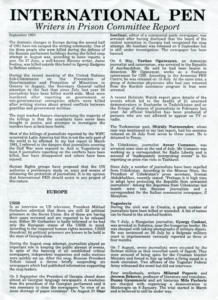
PEN International’s Writers in Prison Committee Report, September 1991 presented to the November 1991 PEN Congress in Vienna. PEN’s complete Case List for this period included 143 pages of cases of writers and journalists around the world reported kidnapped, “disappeared,” executed, having died in custody, imprisoned, banned, under house or town arrest, deported or awaiting trial.
Controversy around the narrow base of decision-making came to a confrontation over the April 1993 Congress in Dubrovnik, Croatia. The Balkan War was raging. At the Rio Congress in December 1992 the American delegate questioned the wisdom of holding the Congress in a war zone not only for reasons of safety but also for the appearance and possible “political misuse” of PEN in one corridor of the riven community and the restrictions on talking freely with the press. Others felt holding the Congress, most of which would be on a ship that would sail from Venice to Dubrovnik, would have a symbolic message of peace and also commemorate PEN’s Dubrovnik Congress 60 years earlier in 1933 when PEN exlcuded official writers of Nazi Germany from the organization. The host center assured that all centers from the region would attend. When delegates asked that the Dubrovnik Congress either be cancelled or postponed, they were told the decision had been made two years before, and there was no need for the Assembly to take a vote. Later as the war escalated, a mail vote was taken and the majority who responded voted for postponement, but the Croatian center, which had put in considerable work, wanted to hold the Congress, and so the plans went ahead.
On April 12, a week before the PEN gathering, the Army of the Republic of Srpska launched an attack on the town of Srebrenica in Bosnia, 200 miles from Dubrovnik. Many PEN Centers chose not to send delegates, including American and German PEN. The Writers in Prison Committee in the person of Thomas also chose not to attend nor did many of the WiPC members. Because there was not a quorum, the gathering was declared not an official congress, but a meeting.
I did not attend either the Dubrovnik meeting nor the earlier Rio Congress. Before the November 1992 Congress in Rio, Thomas and International Secretary Alexander Blokh without consulting with each other asked if I would take over the Chair of the Writers in Prison Committee when Thomas finished his term in September 1993. The fact that these two individuals both came to me made me consider carefully, but I was among the younger generation of PEN members who was urging more democratic procedures for PEN. I didn’t think the Chair should be an appointive office but should have the input of the PEN members, but in 1992, PEN had no such systems in place. Alex told me that he would canvas people at the Rio Congress to see if they agreed and get back to me. I don’t know what process was used nor how widely he asked, but he and Thomas returned in agreement and urged me to accept. I agreed, though I said that when my term was up, I wanted to assure we had set in place a more democratic system for nominations and election of the WIPC Chair. And so we did and have ever since.
Next Installment: PEN Journey 9: The Fraught Roads of Literature
PEN Journey 7: PEN in Times of War and Women on the Move
PEN International celebrates its Centenary in 2021. I’ve been active in PEN for more than 30 years in various positions and now as an International Vice President Emeritus. With memories stirring and file drawers of documents and correspondence bulging, I am a bit of a walking archive and have been asked by PEN International to write down memories. I hope this personal PEN journey will be of interest.
Iraq invaded Kuwait August 2, 1990. When I picked up my 10-year old son from camp in the U.S. that summer and told him what had happened, his first response was: What about Talal and Alec? These were two of his good friends at the American School in London—one was son of the Kuwaiti Ambassador; the other was from Iraq. He quickly understood the consequences. Fortunately, both of his friends had been out of their countries at the time, though I don’t recall Alec returning to the American School that fall. When the bombs dropped on Baghdad in January, the American School went into lockdown. The older students were issued identity cards. The security force around the school multiplied. When Talal came over to play that winter, he was accompanied by two imposing body guards who stayed outside.
Though the fighting in Iraq concluded by the end of February, security in London continued. By the end of March, the war in the Balkans had begun. Both wars brought to a close the honeymoon many felt after the fall of the Berlin Wall.
For PEN, the outbreak of war in Iraq and in the Balkans led to the cancellation of the planned Delphi Congress and to the convening of conferences in Europe and a two-day gathering of PEN’s Assembly of Delegates and international committees in Paris in April 1991. Delegates from 39 PEN centers came together to conduct the business of PEN at the Société des Gens de Lettres de France which occupied the 18th-century neoclassical Hôtel de Massa on rue de Faubourg-Saint-Jacques in the 14th arrondissement of Paris. There were no literary sessions or social gatherings, or the usual simultaneous translation of proceedings. The business was conducted primarily in English with intermittent French, the two official languages of PEN. (Spanish was added a few years later as PEN’s third official language.)
The Gulf War, the ethnic conflict in the Balkans, the aftermath of the Tiananmen Square trials and the ongoing fatwa against Salman Rushdie predominated discussions in Paris and later in November at the 56th PEN Congress in Vienna. The Gulf War had resulted in increased numbers of writers imprisoned and killed in the Middle East and an increase in censorship. Resolutions condemning the detention and imprisonment of writers in Saudi Arabia, Syria, Israel and Turkey passed the Paris Assembly. Little information was available from Iraq. Another resolution in Paris sponsored by the two American centers expressed concern to the U.S. government and all U.N. member states over the restrictions placed on journalists during the war and urged a review of the ground rules for journalists in conflicts.
Turkey and China continued to hold the largest number of writers in prison, as has been the case for most of my 30-year involvement with PEN. At the time the Turkish government had announced an amnesty for approximately a third of the writers, and there was some hope they might release the additional 80, but new laws were also proposed that could be used against writers. In China where 87 cases were reported, the authorities had announced the end of investigations on the leaders of the June 1989 Democracy Movement. Most sentences were lighter than expected with credit given to human rights organizations like PEN who had kept up pressure.
However, this was not the case for Wang Juntao, a 32-year old academic and Deputy Editor of the Economics Weekly newspaper. In a letter to his lawyer published at the time in The South China Morning Post Wang Juntao explained why he had spoken as he had at the trial even though he knew his penalty would be more severe. “…Only by so doing can the dead rest in peace, since on the soil where they shed blood there are still some compatriots who take risks and speak out from a sense of justice in the most difficult circumstances…” His lawyers had been given just four days to prepare his defense. He was sentenced to 13 years in prison with four years subsequent deprivation of political rights for the crime of conspiracy to subvert the government and for carrying out counter-revolutionary propaganda and incitement. His lawyers pressed him not to appeal so his wife had to do so and was given only three days. The appeal was rejected. [In 1994 Wang Juntao was one of the prisoners the U.S. demanded be released as a condition for trade talks. He was released from prison for medical reasons and now lives in exile in the United States where he has studied and received advanced degrees from Harvard University and a PhD from Columbia University. PEN was among the organizations which lobbied for this release.]
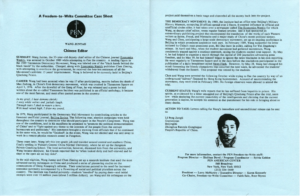
PEN International’s case sheet for Wang Juntao sent by fax and mail in 1990 to centers and members. In 1991 PEN International launched a Rapid Action Network to notify centers and to summarize the cases, actions and advocacy.
During this period PEN through its partnership with UNESCO convened writers in the Middle East and also writers in the Balkans to find common ground and to search out the pylons upon which bridges might be built and to monitor the situation for the writers in the regions. However, because of the Balkan War, it wasn’t possible to hold the meeting with the Yugoslav Centers in Bled as the Slovene Center had proposed. Instead PEN International President György Konrád hosted the gathering in Budapest and followed up with a meeting of South-Eastern European centers in Ohrid, hosted by Macedonian PEN though the Croatian Center wasn’t able to attend. The discussion included the desirability of recognizing the right of conscious objection in time of civil war and the possibility of solving the problem of minorities by allowing multiple citizenship.
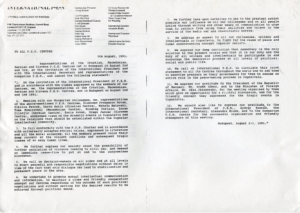
Summary statement of the August, 1991 Conference on the Balkans with all centers from the former Yugoslavia attending except the Bosnian Center, which didn’t come into being until the following year.
In addition to convening dialogues among writers and lobbying on behalf of threatened writers during the Balkan conflicts, PEN also provided financial assistance. Boris Novak, the Slovene Chair of PEN’s Peace Committee and President of Slovene PEN took many precarious trips into war-torn Sarajevo during the almost four-year siege of the city. At one point he reported at least 52 writers and their families were trapped and could only leave if invited to an international peace conference. Slovene PEN planned to host such a conference and invite the writers and their families with the hope the U.N. Peacekeeping Force could provide protection for their exit. He urged other PEN centers to assist in finding residences and perhaps temporary teaching appointments or fellowships for these writers. He also delivered aid to trapped writers, aid gathered from other PEN Centers, donated to the Writers in Prison Committee Aid Fund and to PEN’s Emergency Fund run out of Amsterdam with Dutch PEN.
In an intersection of conflicts, the German and Finnish publishers of Salman Rushdie’s Satanic Verses donated their proceeds from the book to PEN’s Writers in Prison Committee. By the Vienna Congress, Rushdie had lived 1000 days under death threat. PEN continued its defense of Rushdie and its protest against the accompanying violence of the fatwa. The Japanese translator of Satanic Verses had been killed, and the Italian translator badly beaten. (Two years later the Norwegian publisher was shot three times and left for dead.) The bounty had increased on Rushdie, and there was allegedly a hit squad deployed in Western Europe to assassinate him.
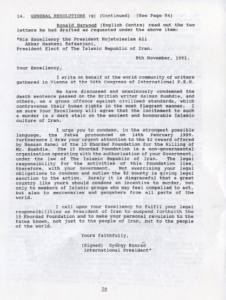
One of many letters sent by International PEN to support Salman Rushdie and to protest the ongoing fatwa.
My personal engagement and memories during this period focused on work with the Writers in Prison Committee and to a lesser extent with the formation of the Women’s Committee, which I supported but which others were driving, and with the establishment of the International PEN Foundation which would be able to receive tax exempt funds for many of these PEN activities. After a discussion of the Foundation’s framework at the Paris Conference, including assurances that the Foundation would not interfere or challenge PEN’s governance, I presented the formal proposal at the Vienna Congress where the Assembly of Delegates approved the establishment of an International PEN Foundation. The Foundation received official charitable status in March 1992 and operated for the next decade until British charitable tax laws changed and a separate foundation was no longer necessary.
Also at the Vienna Congress the Women’s Network, which had formed at the Canadian Congress in 1989, gained approval as a standing committee of International PEN with assurances that men and women were welcome and would work together. Meredith Tax, a chief strategist and one of the founders, explained the committee would involve more women in the work of PEN at all levels and address problems that particularly affected women writers in developing countries and would enable women to know each other’s work, much of which was not translated. “The Women’s Committee will be a force to strengthen, not weaken PEN,” she assured the Assembly.
The eventual governance of the Women’s Committee included PEN members from around the world and its chair rotated to different regions. Each of PEN’s standing committees had its own governing structure. The Women’s Committee was unique in its inclusiveness, which had its own challenges, but which foreshadowed a more inclusive governing structure for PEN International. Twenty-eight PEN centers signed up for the committee with 70 delegates and members, including men, attending the initial meeting.
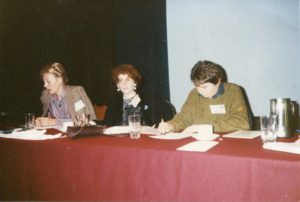
L to R: Moniika van Paemel, (Belgium Dutch-speaking PEN) and Meredith Tax (American PEN) at Women’s Committee Planning meeting at Canadian Congress, 1989
At the time International PEN’s leadership was all male. In its 80-year history International PEN had never had a woman President and only one woman International Secretary and few women as Committee chairs though in many centers of PEN there was a growing balance of men and women members and leaders. In 2015 novelist and poet Jennifer Clement was elected the first woman President of International PEN.
Next Installment: PEN Journey 8: Thresholds of Change…Passing the Torch
PEN Journey 5: PEN in London, Early 1990’s
PEN International celebrates its Centenary in 2021. I’ve been active in PEN for more than 30 years in various positions and now as an International Vice President Emeritus. With memories stirring and file drawers of documents and correspondence bulging, I am a walking archive and have been asked by PEN International to write down memories. I hope this personal PEN journey might be of interest.
I moved to London where International PEN is headquartered in January 1990 from Los Angeles. I came with my husband and my 9 and 11-year old sons who rarely wore long sleeves, let alone coats or jackets. A few weeks into our resettlement, London spun in its first major tornado of the decade with hail and winds whipping at hurricane force and cars and trees toppled and a few rooftops airborne. The weather was highly unusual for London. Our family, who was still in temporary housing, took the unwelcome weather as a welcome of sorts, signaling that we might just be in for an adventure. Did you see that roof flying…!
There were still complaints: only four television channels, movies strictly restricted by age and when you did get into a theater, you had assigned seats, milk that went bad in a day, delivered on the stoop in glass bottles, a refrigerator that barely held enough food for a day, appliances that came without plugs…And where was the sun?
Yet the magic of the city quickly affected us all. My youngest son discovered the best skateboarders lived in London, and London (and England) was full of history and castles, and my oldest son, who was soon moved ahead a grade in school because he was highly talented in math, met students from all over the world in his class at the American School, a few of whom talked and imagined in his orbit. He was put on the rugby team to help socialize and the following year on the wrestling team, where he eventually, as an adult and by then dual citizen, wrestled for Great Britain in the Olympics.
For me, finding home in London meant connecting with PEN, both International PEN and English PEN. Writers can be members of more than one PEN center, though can vote with only one center. I’d begun my PEN journey in Los Angeles at PEN Los Angeles Center (changed to PEN USA West). When my second book was published, I also joined PEN American Center, based in New York, and now in London. I joined English PEN, the oldest and the original PEN center since the organization was founded by British writers in 1921. International PEN and English PEN had separate offices, but the Administrative Secretary of International PEN and the General Secretary of English PEN were longtime friends and actually lived next door to each other in Fulham. The two organizations worked independently, yet closely together.
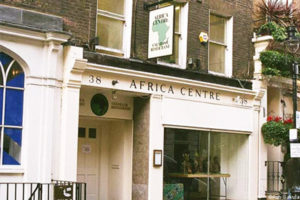
Early on I visited International PEN’s office, headquartered in Covent Garden on King Street in the Africa Centre. To get to the office at the front of the house, you had to go through the Africa Book Shop on the first floor. PEN had two rooms with several desks in the larger room with papers stacked everywhere. There was a filing cabinet and a photocopier and just enough space to squeeze between to get to the desk looking onto the street.
International PEN was kept functioning by the stalwart and efficient Elizabeth Paterson, who I don’t recall getting angry at anyone even as the work piled on and people around the world in PEN centers asked more and more of her, including the smart, demanding International Secretary Alexander Blokh. Alex flew in every month, usually from Paris, and displaced the Writers in Prison Committee’s small staff from the second office in order to conduct the business of PEN around the world. Alex was a former UNESCO official, and at that time UNESCO was one of International PEN’s major funders. When UNESCO was formed, according to Alex, it established organizations for the various arts, but when it came to literature, it recognized that PEN already existed, and so its outreach and funding funneled through PEN. Over the years PEN has grown more and more independent of UNESCO support.
Elizabeth, with her quiet intelligence and subtle humor, managed to keep International PEN running day to day while Alex developed the literary and cultural programs with the centers and the standing committees—the Translation and Linguistic Rights Committee, the Peace Committee, and the Writers in Prison Committee (WiPC). The WiPC tended to operate more autonomously with its elected chair Swedish publisher Thomas von Vegesack and before him Michael Scammell. When I arrived in London, there was also a petite gray-haired woman Kathleen von Simson, a volunteer who’d helped manage the Writers in Prison Committee work for years. PEN had recently hired a paid Coordinator Siobhan Dowd whose task was to professionalize the human rights work, and Siobhan hired researcher Mandy Garner. The two of them worked in the tiny second room. Siobhan eventually crossed the ocean to head up the Freedom to Write program at American PEN.
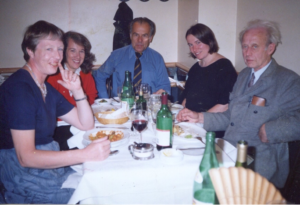
Fall 1990. Left to right: Elizabeth Paterson, Joanne Leedom-Ackerman, Per Wastberg (former PEN International President), Siobhan Dowd, Bill Barazetti
Also finding space on King Street was the Assistant Treasurer (and later International Treasurer) Bill Barazetti, who at that time was an unsung hero from World War II. It was later publicized that Bill had smuggled hundreds of Jewish children out of Prague with false identity papers he arranged. He was a wiry gray-haired former intelligence officer who’d also interrogated captured German pilots. Alex Blokh, whose pen name was Jean Blot, was an exiled Russian Jew, a lawyer and had also been active in the French Resistance during World War II, and Elizabeth had endured the bombings in London during the War. Though it was 1990 and the Berlin Wall and other barriers which had gone up after World War II were now falling, in the PEN office there was still a feeling of that post-War period, an abstemiousness and a fortitude of the dedicated amateur who knew what sacrifice was and endured no matter what. I couldn’t articulate the atmosphere at the time, but as an American born after the war, grown up in Texas and moving to London from Los Angeles, I felt the contrasts and the constraints. One small incident I remember was when a donation for a baby gift for the newly hired Sara Whyatt was being gathered. I offered £20 for the pot and was told by Elizabeth, “Oh, no, that amount would embarrass her.” The concept of anyone being embarrassed by a pooled £20 contribution silenced me. I put in £10 instead, still considered a large amount. Because I was new and an American, I tried to listen and learn, but I understood expectations and horizons were different.
A generation of my own joined the office in the persons of Jane Spender, a former editor, smart and literary who worked with Elizabeth and later Gilly Vincent, who took on the part time assignment to help with development work for the eventual International PEN Foundation. (see PEN Journey 4) Later Gilly became General Secretary of English PEN. I quickly learned to respect the differences; the American way was not the British way. I remember a fundraising event in which there must have been 20 major English writers featured and attending, and the ticket price was £25. The PEN Foundation netted perhaps £3000 that evening. In New York with that line up of writers, I am confident American PEN would have added at least one, if not two, zeros to the proceeds, but we were in London, and the event was not a glittery affair but more like a large family gathering of literary friends at someone’s home.
PEN International moved its offices in 1991 from Covent Garden to Charterhouse Buildings in Clerkenwell nearer the City of London. The new offices were on the top floor of a bonded warehouse, and I never met anyone who didn’t arrive breathless after climbing the steep four or five flights of stairs. There was no elevator, but there was an outside hoist where PEN could load supplies and mail out the window and drop or raise these to and from the ground, preferably not in the rain. Elizabeth set the door code as the beginning and ending years of World Wars I and II, an 8-digit code everyone could remember. The offices at Charterhouse Buildings were spacious compared to King Street—two large airy rooms, one for the Writers in Prison Committee and one for all the other work of PEN, a spacious entry room used as a meeting area and a smaller private office where the International Secretary could work or small meetings could be held. All the rooms were painted “magnolia”–a creamy white/yellow color. The full-time staff by then was, I think, three, along with four or five part-time staff and volunteers, including Jane Spender, Peter Day, editor of PEN International magazine, Bill Barazetti and later his daughter Kathy and occasional interns.
When Siobhan prepared to leave for the U.S., Thomas asked me to interview candidates with him for her replacement. Between interviews he explained to me his view of England in the constellation of Europe by a story of when a fog settled over the English Channel and the headline in a British paper announced: Continent Isolated. Later, when the Channel Tunnel finally connected Great Britain to France in 1994, I sent Thomas a note and a copy of the headline from a British paper: “You’ll be glad to know, Thomas: Continent No Longer Isolated, the headline read.
Thomas and I agreed on the best candidate, and PEN hired Sara Whyatt as the new Program Director of the Writers in Prison Committee. Sara came to PEN from Amnesty and set about further professionalizing WiPC’s research and advocacy work. Sara and Mandy split up the globe, with Mandy focusing on Latin America and Africa.

Across London in Chelsea, English PEN rented offices from the London Sketch Club on Dilke Street where it held weekly literary programs, a monthly formal dinner, an annual Writers Day Program honoring one writer—Arthur Miller, Graham Greene, and Larry McMurtry were three I recall—and a mid-Summer Party. The literary programs and dinners, held in the Sketchers studio and bar, featured writers such as Michael Ignatieff, Germaine Greer, Michael Holroyd, Jan Morris, Rachael Billington, A.L. Barker, Penelope Lively, Andrew Motion, A.S. Byatt, Margaret Foster, William Boyd, Margaret Drabble, Iris Murdoch, and frequently Antonia Fraser, Harold Pinter and Ronald Harwood, just to name a few.
When I moved to London and joined English PEN, the General Secretary Josephine Pullein-Thompson, a stalwart writer/member, managed the organization and kept it running with minimal staff and with active members. Author of young adult novels, Josephine wrote books about young girls and horses. When I close my eyes, I can hear her gruff voice and see her square face and think of horses. She was pragmatic and no-nonsense and what I think of as the epitome of a certain era of British resolve. She befriended me early, I think, because I was focused on a task—getting charitable status for PEN International which ultimately allowed English PEN to claim the same. It was Josephine years later who nominated me as a Vice President of International PEN.
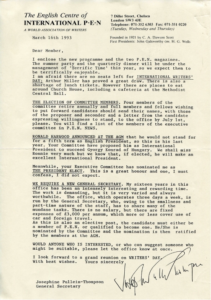
Members of English PEN were passionate about PEN’s mission to protect and speak up on behalf of writers under threat in oppressive regimes. Among activities, members, including notable British writers such as Ronald Harwood, Harold Pinter, and Antonia Fraser, who were good friends, and Moris Farhi, a Turkish/British novelist with a great beard, great girth and great heart, who later succeed me as Writers in Prison Chair, and dozens of other English PEN members held vigils, often by candlelight. They protested outside embassies of countries where writers were in prison. They got press coverage and ultimately helped secure the release of writers, particularly those in former Commonwealth countries like Malawi.
Malawian poet Jack Mapanje recalled his spirit lifting when he saw the press clippings of Harold Pinter and others protesting outside the Malawi Embassy in London on his behalf. When he was released, he resettled in England and joined English PEN.
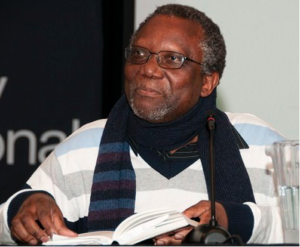
Jack Mapanje
Next Installment: Freedom and Beyond…War on the Horizon
PEN Journey 2: The Fatwa
PEN International celebrates its Centenary in 2021. I have been active in PEN for more than 30 years in various positions, including as Vice President, International Secretary and Chair of International PEN’S Writers in Prison Committee. With memories stirring and file drawers bulging with documents, I am a bit of a walking archive and have been asked by PEN International to write down memories. In digestible portions I will recount moments, though I’m not certain I can contain all these, but I hope this personal PEN journey may be of some interest.
It was President’s weekend in the US—between Lincoln and Washington’s birthday, coinciding with Valentine’s Day, 1989. I was President of PEN Center USA West and had just hired the Center’s first executive director ten days before. I’d been working hard with PEN and was also finishing a new novel, teaching and shepherding my 8 and 10-year old sons. For the first time in a year and a half my husband and I were going away for a long weekend without our children. He had also been working nonstop and had managed to clear his schedule.
On the plane to Colorado where we planned to ski, I read that Salman Rushdie’s The Satanic Verses had been burned in Birmingham, England. The next day Ayatollah Khomeini issued a fatwa against Rushdie. What was a fatwa? The Supreme Leader of Iran was calling for the murder of Rushdie wherever he was in the world, and he was offering a $6 million reward. As information about the fatwa developed, it also included a call for the death of whoever published The Satanic Verses.

I began making phone calls. This was a time before omnipresent cell phones so I had to find phones and numbers where people could reach me. (Usually our vacation dynamic was that my husband was on the phone.)
That first day I skied and wrote press releases on the ski lift and stopped at lodges on the mountain to use the pay phones to communicate with our new executive director. I’d ski another run then call the office again to answer questions from the press. What exactly was a fatwa, we were still asking? What did this mean for a writer? By the end of the day, I told my husband I had to return to LA.
“Can’t this wait?” he asked.
“No, it can’t,” I said.
Though a fatwa was a new concept, I understood, as did PEN members around the world, that a threshold had been crossed when a head of state issued a death warrant on a writer wherever he was in the world. Our two sons came out to be with my husband, and I returned to LA. Our board went into action as did PEN Centers around the globe to protest the fatwa. We organized a public event at the Los Angeles Times with writers and experts, an event which included readings from Rushdie’s book. Some were frightened by the threat, but most in PEN gathered. We contacted US government officials and began coordinating with global PEN centers, including American PEN in New York to confirm the support of writers for Rushdie and to protest Khomeini’s action.
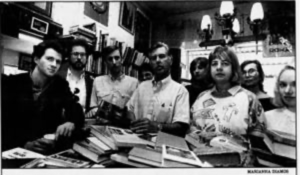
Davis Dutton, center, of Dutton’s Books with some of his employees who voted to ignore the threats from Iran and stock “The Satanic Verses.”
Whatever the controversy over The Satanic Verses and its “insult” to Muslims, PEN was clear that the right of the writer to write without fear of death was primary.
The mobilization included discussions with bookstores to encourage them to keep the book on the shelves for many were quietly removing it. The fuller scope of our PEN’s actions at the time is described in the column below in the PEN Center USA West’s newsletter and in a story in the Los Angeles Times.
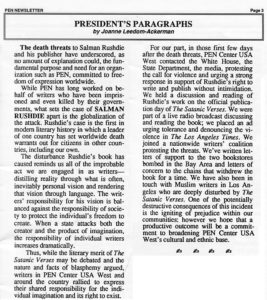
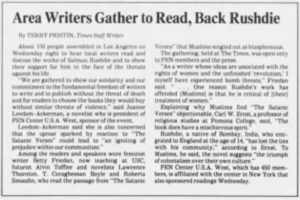
Los Angeles Times, February 23, 1989
Next Installment: PEN Journey 3: Walls About to Fall
PEN Journey 1: Engagement
PEN International celebrates its Centenary in 2021. As Vice President Emeritus of PEN International and former International Secretary, former Chair of PEN International’s Writers in Prison Committee, former President of PEN Center USA West, board member and Vice President of PEN America and the PEN/Faulkner Foundation, I have been active in PEN for more than 30 years. With memories stirring and file drawers bulging with documents, I am a bit of a walking archive and have been asked by PEN International to write down some of the memories. I will try in digestible portions to recount moments, though I’m not certain how easily I can contain all these. I hope this personal PEN journey might be of some interest.
February 13, 1989: I was President of PEN Center USA West and on an airplane when I read that Salman Rushdie’s novel Satanic Verses was being burned in Birmingham. The next day a fatwa was issued on Rushdie. What was a fatwa, we all asked at the time, as we, along with PEN Centers around the world, mobilized to protest that a head of state was ordering the murder of a writer wherever he was in the world.
November 10, 1995: As Chair of PEN International’s Writers in Prison Committee, I was standing vigil with others outside the Nigerian Embassy in Washington, D.C. when word spread that novelist and activist Ken Saro Wiwa had been hanged that morning in Port Harcourt, Nigeria.
October 7, 2006: My phone rang at 7:30 on Saturday morning. I was International Secretary of PEN International, and the International Writers in Prison Program Director was calling to tell me that Anna Politkovskaya had just been shot and killed in Moscow. We all knew Anna—I’d last had coffee with her at an airport in Macedonia. We worked with her on the situation of writers in Russia and Chechnya and had enormous respect for her knowledge and courage.
January 19, 2007: We were about to begin a PEN International board meeting in Vienna when a call came from Istanbul. Hrant Dink had just been shot and killed outside his newspaper office in Istanbul. Dink was an editor of an Armenian paper and a writer whom members of PEN knew well and worked with on freedom of expression issues in Turkey.
Most writers long active in PEN’s freedom-to-write work can tell you where they were when the news broke on each of these cases. They can tell you because the lives of these writers and many others have been critical in the struggle for freedom of expression around the world.
In sharing memories of PEN, I begin with the writers and with the many friends around the globe who work on behalf of writers who don’t have the freedom to write without threat, imprisonment or death. As colleagues, we are bound together by the belief that truthful writing matters, be it journalism, fiction, poetry, drama, essays because stories and witnessing and creative imagination connect, inspire and shape us. Free expression is fundamental to a free society and is worth defending and expanding.

Salman Rushdie, Ken Saro Wiwa, Anna Politkovskaya, Hrant Dink
My own thirty plus years working with PEN began at a dinner meeting in Los Angeles in the early 1980’s. I was a young writer, new mother, former journalist who’d recently moved across the country from New York City where I taught writing at university and had friends and colleagues. I landed in the land of sun and Hollywood, and though I had a new college teaching job, I knew few people and even fewer writers. Like many who first seek out PEN, I came for the community.
My second meeting was at someone’s home where a presentation was made about writers in different parts of the world who were in prison because of their writing. I was introduced to PEN’s Writers in Prison Committee. At that meeting, we wrote postcards urging the Chinese government to release Wei Jingsheng, a writer who was imprisoned for “counterrevolutionary” activities, particularly for his essay “The Fifth Modernization” which he’d posted on the Democracy Wall in Beijing in 1978. His manifesto argued that as China was modernizing with four principles of modernization, it needed to include a fifth modernization–Democracy.
As I learned about Wei Jingsheng and the other writers on whose behalf PEN worked, I became more active in the PEN Center on the West Coast of America called PEN Los Angeles Center. I was elected President in 1988. Shortly after the election, I attended my second PEN International Congress in Seoul, South Korea right before the Olympics there. (The first Congress I attended was in 1986 in New York City, where our Center’s members were registered with the foreign delegates. I was active at that New York Congress in the Women’s revolution and the statement that came from the Congress.)
I arrived in Seoul late summer,1988 with our Center’s support for resolutions including one calling for the release of Wei Jingsheng and other writers in China, another resolution addressing writers in prison in South Korea, including our honorary member, publisher Lee Tae-Bok, and a resolution to change the name of PEN Los Angeles Center to PEN Center USA West. The name change had been passed by our center’s previous board but needed approval of the international Assembly of Delegates. It reflected our wider membership in the western part of the United States.
As president of PEN Los Angeles Center, I arrived as a young writer with a small delegation from Southern California, which included the former book editor of The Los Angeles Times and an English professor from UCLA. American PEN, based in New York, the largest of PEN’s more than 60 worldwide centers at the time was headed by Susan Sontag, president. American PEN didn’t want us to change our name and opposed our resolution on the floor of the Congress. While our two centers agreed on the other substantive issues of the Congress, including the problematic situation for writers in South Korea, and though we shared meals, the American PEN delegation, and Susan Sontag in particular, tried to get us to withdraw our name change, including a midnight call to me from Susan. The name change would be confusing, she said, and would take from the national scope of American PEN’s work. In that midnight call I listened to the arguments, then shared our thinking, which included the observation that our membership already came from many states west of the Mississippi, that in a country the size of the United States, PEN allowed more than one center, and for writers 3000 miles from New York, there was value in having more than one center of gravity. In the morning I presented American PEN’s arguments to my delegation, and we decided to go ahead and let our resolution go to the floor of the Assembly.
The representative from East Berlin noted: It would seem the East and West of America get along worse than the East and West of Germany. PEN Los Angeles Center’s resolution for a name change won by a wide margin, and we left the Congress as PEN Center USA West, which years later became PEN USA. I no longer live in Los Angeles but note that only in the past year –2018—did the members of the West Coast PEN decided to merge with PEN America in New York so there is now only one center of PEN in the US.
Most memorable and significant from the Seoul Congress was our delegation’s visit with the family of Lee Tae-Bok, our honorary member. “The house of Lee Tae-Bok’s parents is neat and spare, bedrooms with tatami mats on the floor, a living room with a sofa, a chair, a fish tank. There is no excess in the house, one senses out of choice. But there is an absence, not out of choice, for Lee Tae-Bok has been away in prison seven years. His mother worries that she will not see her oldest son out of prison before she dies,” I wrote in our Center’s newsletter. The family said that Lee Tae-Bok was in poor health and held in a cell four by five square meters, allowed out in the fresh air for only twenty minutes a day and wasn’t allowed to write except one letter a month to his family. His mother lamented the “hypocrisy” of the Korean government which had sentenced her son to life in prison because they said he published communist propaganda and yet they were greeting writers and “honored guests” at PEN’s Congress from Communist countries as well as inviting Eastern bloc athletes to Korea for the Olympic Games.
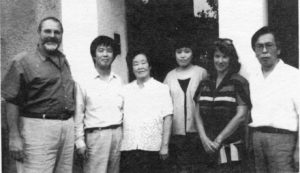
Digby Diehl and Joanne Leedom-Ackerman meet with the family of Lee Tae-Bok at the Lee home in Seoul in 1988.
In addition to our family visit, PEN Congress delegates petitioned the South Korean government on behalf of those in prison. A delegation from PEN International visited two of the writers in prison.
A few weeks after the Congress, notification reached us that Lee Tae-Bok had been released, though not everyone PEN spoke up for was released. I still remember where I was—I was in New York—when I heard the news, and I remember the elation. Many people worked on Lee Tae-Bok’s behalf so we couldn’t and didn’t take the credit, but we could feel some part of our actions, some push at the prison door helped spring it open. Release is not always the outcome for PEN’s work, but often it is. It is one of the goals. Over all my years in PEN, the release of a writer from prison still evokes a burst of hope and a measure of faith.
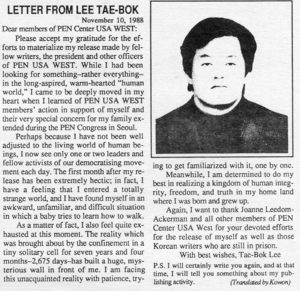
[Next installments: the watershed year 1988-1989 as the first global fatwa is issued against a writer, and writers and students in Tiananmen Square square off against China.]
Next Installment: PEN Journey 2: The Fatwa